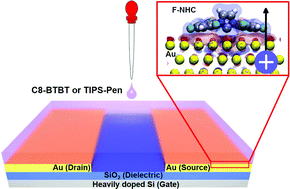Surface modification with a fluorinated N-heterocyclic carbene on Au: effect on contact resistance in organic field-effect transistors†
Abstract
Providing strong carbon-metal (C–M) bonds, N-heterocyclic carbenes (NHCs) recently were introduced as surface modifiers for various applications. Here we report a fluorinated NHC (F-NHC) monolayer chemically bonded to Au with high thermal stability up to 200 °C. The effect of F-NHC modification on contact resistance in organic field-effect transistors (OFETs) was further investigated. In comparison to devices without F-NHC modification, transistors with the F-NHC modified gold electrodes show a significant improvement in carrier mobility in the saturation region owing to the reduced contact resistance (Rc). Density Functional Theory (DFT) calculations indicate that, when bonding to Au, the F-NHC molecule transfers 0.40 e to Au and creates a doping interface between Au and p-type organic semiconductors. The charge transfer between the F-NHC and Au leads to a generation of holes at the F-NHC/organic semiconductor interface, which may cause an efficient carrier tunneling for contact resistance improvement. The work lays the foundation for the future applications of carbenes in organic electronics.



 Please wait while we load your content...
Please wait while we load your content...